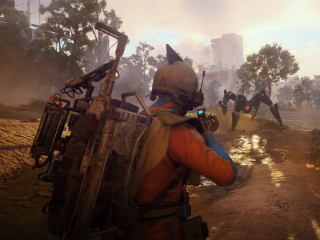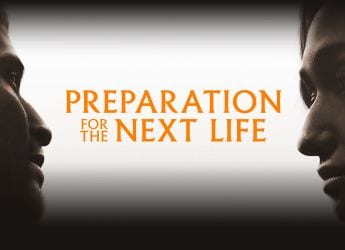- Home
- Entertainment
- Entertainment Reviews
- Netflix's Lost in Space Is Like 'Lost', but in Space
Netflix's Lost in Space Is Like 'Lost', but in Space

Photo Credit: Netflix
The robot, and Maxwell Jenkins as Will in Netflix's Lost in Space
Back in the 1960s, the original Star Trek series from Gene Roddenberry overlapped for two years with the original Lost in Space from Irwin Allen. Though both shows were set in space, they were opposites tonally: Trek was the more cerebral one of the two, because Allen's show left its adventure roots early on for the campy style that had worked wonders for the Adam West-starrer Batman series. Lost in Space saw more success then, but that's not how it panned out in the long run, as everyone knows. Five decades later, on the heels of Trek getting its sixth series, Lost in Space is back to overlap once again, although this time it's got the same tone as its counterpart, Star Trek: Discovery.
Just like the original, the new Lost in Space – the first season of 10 episodes premières Friday, April 13 on Netflix worldwide – follows the Robinson family of five: the aerospace engineer and mother Maureen (Molly Parker), the Army vet and father John (Toby Stephens), the doctor-in-training and eldest child Judy (Taylor Russell), the middle-child Penny (Mina Sundwall), and the youngest Will (Maxwell Jenkins). The show's setup is a bit like Interstellar: with Earth becoming inhospitable thanks to a meteor strike and human activity, mankind has begun settling on an Earth-like planet in Alpha Centauri, the nearest galaxy to the Milky Way, to ensure its survival.
The Robinsons have been selected for the mission, but when we first see them in the pilot episode, there's already been a problem: a space-time incident has pushed their spaceship off-course, and they are forced to crash land on an unknown (though luckily, habitable) planet. Of course, that's only the beginning of their problems, which includes saving their ship from a glacier, and finding a way to contact their mothership. It turns out they aren't the only survivors a few episodes in, and the show starts to resemble the popular 2000s drama Lost, but in space.
![]()
Molly Parker as Maureen, and Toby Stephens as John in Netflix's Lost in Space
Photo Credit: Netflix
Nevertheless, Netflix's Lost in Space reboot has a good premise, and it's got the making of some interesting character dynamics at its core. Maureen and John are separated, and the only reason they're still together is for the kids. Leaving everything behind and embarking on a trip to another galaxy with your estranged spouse is great material for any series. Moreover, their eldest child, Judy, is mixed-race from Maureen's first marriage, which also drives competition with her-step sibling Penny. The youngest, Will, doesn't think he has what it takes to be on this mission, and is constantly doubting himself.
Further complications arise as the show progresses, first in the shape of an eight-foot tall humanoid robot with six limbs when needed – a more modern take on the original – who takes after Will, and becomes a constant companion, followed by human supporting characters Dr. Smith (Parker Posey), the original show's villain now gender-swapped but still manipulating everyone to do her bidding, and Don West (Ignacio Serricchio), a smuggler who prefers calling himself "importer-exporter".
Add to this great production values thanks to Netflix supplying the cash, with everything from the main ship, the surface vehicle, the suits, and the equipment looking believable – Lost in Space is set only 30 years into the future – and designed with the principle of form follows function. The robot is the only exception to that rule, which has so many edges that you'd probably cut yourself by just walking past him, though there's every possibility that's the intention.
![]()
Taylor Russell as Judy, and Mina Sundwall as Penny in Netflix's Lost in Space
Photo Credit: Netflix
Though Lost in Space is self-serious for the most part, it's also self-aware, and the writers and co-creators Matt Sazama and Burk Sharpless – their credits include Dracula Untold, The Last Witch Hunter, and Gods of Egypt – are not afraid to undercut its heavy moments. That task falls to Penny more often that not, who gets to deflate every serious moment with her quips and observations, and prevents the show from sliding into becoming too serious for its own good. But the good work is repeatedly knocked over by hasty writing elsewhere, from making smart characters do stupid things, or have useless characters to begin with.
Struggling to escape a storm after they crash land, Dr. Smith steals the only remaining flare from West, essentially leaving him for dead. You'd expect their next meeting to be confrontational and explosive, but it's a lot milder, and West casually accepts Smith's unbelievable explanation. In another episode, Maureen has trouble with a high-altitude balloon and almost ends up being dragged off a cliff, but she's successful in the next scene. It's like the writers know what they want to achieve, but they don't know how to get there convincingly.
And in extreme contrast, Lost in Space has episode-long plotlines where characters achieve next to nothing. One character is literally frozen in ice for one episode, and three characters walk from A to B and then back to A in another episode, but none of this is close to the sheer uselessness of Dr. Smith. She figuratively and literally stands around doing nothing, having no purpose except to derail things in her unintelligent and obvious ways, which got so annoying over four episodes that this critic wanted to put his fist through the screen every time she showed up.
![]()
Parker Posey as Dr. Smith in Netflix's Lost in Space
Photo Credit: Netflix
In doing all this, the issue isn't just that the show is spinning its wheels or building moments to a crescendo without earning them, but that it has no meaningful long-term impact on the storyline and characters. And this is before you start counting the things Lost in Space straight-up overlooks. Minutes after supposedly being "the first human to encounter artificial intelligence", Will turns the robot into his servant. It's unintentionally hilarious. And since the robot doesn't speak, except for the catch-phrase 'Danger, Will Robinson' which seems to exist purely as a call-back to the original show sometimes, it doesn't have any real role to play.
The bigger worry is how blind the show is to issues of class and privilege. In one episode, Maureen tells her children that only "the best and brightest" will be chosen as colonists, and if they pass a series of tests – which they have a higher chance of thanks to their upbringing, it leaves unsaid – they and future Robinsons will get to enjoy a world without war and climate change. Lost in Space seems to have no idea of the dual ironies of that promise: one, it's usually the richest who cause most harm to the environment and are least impacted, and two, the problems on Earth aren't inherent to the planet, they are a man-made problem; wherever humans go, they'll bring those problems with them.
Ultimately, the show wastes a good premise – explorers venturing into the unknown to start anew light-years away from everything they've known – by being lazy with its storylines and character work, using clichéd sci-fi narrative shortcuts of people doing dumb things (this is one reason why Annihilation was such a refreshing exception), and making up new science to generate high-stakes as and when necessary that diverts from its focus on realism. In all those ways, Lost in Space is still unlike Star Trek, and seems destined to play second-fiddle, unless it gets a writing revolution. Hopefully, it won't take another fifty years.
Lost in Space Season 1
- Release Date 13 April 2018
- Genre Action, Adventure, Drama, Kids & Family, Fantasy, Sci-Fi
- Cast Molly Parker, Toby Stephens, Maxwell Jenkins, Taylor Russell, Mina Sundwall, Ignacio Serricchio, Parker Posey, Brian Steele, Ajay Friese, Sibongile Mlambo
- Director Tim Southam, Stephen Surjik, Neil Marshall, Deborah Chow, Vincenzo Natali, David Nutter, Alice Troughton
- Producer Neil Marshall, Zack Estrin, Kevin Burns, Jon Jashni, Matt Sazama, Burk Sharpless, Marc Helwig, Alex Graves
Catch the latest from the Consumer Electronics Show on Gadgets 360, at our CES 2026 hub.
Related Stories
- Samsung Galaxy Unpacked 2025
- ChatGPT
- Redmi Note 14 Pro+
- iPhone 16
- Apple Vision Pro
- Oneplus 12
- OnePlus Nord CE 3 Lite 5G
- iPhone 13
- Xiaomi 14 Pro
- Oppo Find N3
- Tecno Spark Go (2023)
- Realme V30
- Best Phones Under 25000
- Samsung Galaxy S24 Series
- Cryptocurrency
- iQoo 12
- Samsung Galaxy S24 Ultra
- Giottus
- Samsung Galaxy Z Flip 5
- Apple 'Scary Fast'
- Housefull 5
- GoPro Hero 12 Black Review
- Invincible Season 2
- JioGlass
- HD Ready TV
- Laptop Under 50000
- Smartwatch Under 10000
- Latest Mobile Phones
- Compare Phones
- Lava Blaze Duo 3
- Tecno Spark Go 3
- iQOO Z11 Turbo
- OPPO A6c
- Samsung Galaxy A07 5G
- Vivo Y500i
- OnePlus Turbo 6V
- OnePlus Turbo 6
- Lenovo Yoga Slim 7x (2025)
- Lenovo Yoga Slim 7a
- Lenovo Idea Tab Plus
- Realme Pad 3
- Garmin Quatix 8 Pro
- NoiseFit Pro 6R
- Haier H5E Series
- Acerpure Nitro Z Series 100-inch QLED TV
- Asus ROG Ally
- Nintendo Switch Lite
- Haier 1.6 Ton 5 Star Inverter Split AC (HSU19G-MZAID5BN-INV)
- Haier 1.6 Ton 5 Star Inverter Split AC (HSU19G-MZAIM5BN-INV)








![[Sponsored] Haier C90 OLED TV | Dolby Vision IQ, 144Hz OLED and Google TV in Action](https://www.gadgets360.com/static/mobile/images/spacer.png)









